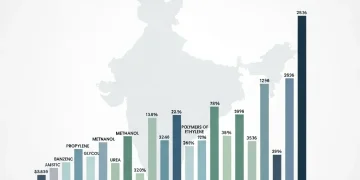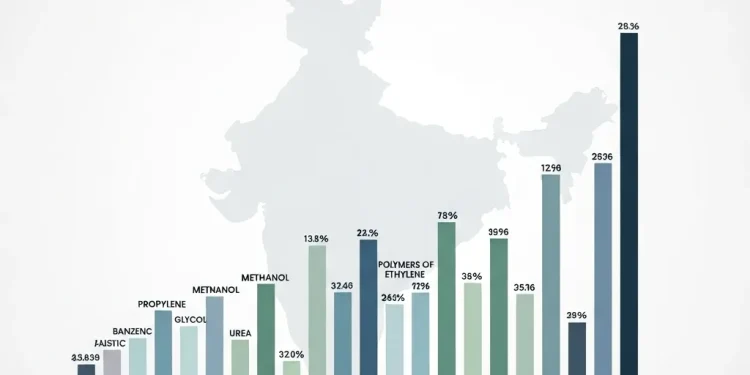Chemical Imports Business: Out of which, Indian market is still one of the most underserved markets for chemicals in the world. Basic raw materials and several intermediates still require heavy imports.
5526.54 billion worth of chemicals could be imported by India in FY2024-2025. There is an indication of substantial domestic demand, local capacity shortfalls and significant backward integration possibilities.
As a result, for entrepreneurs and start-up businesses, evaluating the primary imports of chemicals of India is important for understanding the scope of investment for local substitution in prospective scenarios and possibilities of international trade.
With the aforementioned information in mind, the following article states the 20 top chemicals projected to be imported in India by 2025.

Crude Petrolem and Petrochemical Oils Phenol-Chemical Imports Business
In India, the imports of crude oil and oil derivatives are mainly comprising petrochemicals are undersupplied in the country which are essential feedstocks for the production of plastics, fibers and polymers.
Thus, with the entrepreneurs vision in mind, there is room for process units of secondary refining, recovery of aromatic compounds, and polymer downstream industry to be developed to fulfill the growing demand.
Phenol
The economy of India is reliant on the imports of phenol due to the high demand for laminates, pharmaceuticals and epoxy resin which is not able to be sufficiently produced in the country.
Acetone
The primary exporting countries include Thailand, Singapore, and the USA. Investors may consider the construction of local phenol refineries in the cumene markets. This would serve the purpose of achieving competitive advantages and bearing less dependency on imports.
Read Our Project Report: Click Here
Acetone is used as a primary solvent in the pharmaceuticals and also used in paints, adhesives and as a byproduct in several phenol plants. India is reported to import more than 150,000 tons of acetone annually.
There is a strong case for entrepreneurship in the form of coupled phenol acetone processing plants, where the latter can achieve high return of investments on the dependent markets.
Methanol
Methanol is imported to India predominantly as a formal compound for methanol, as well as for the production of formaldehyde, acetic acid, biodiesel and hydrogen. The primary sources of import are Saudi Arabia, Iran and Qatar.
There are opportunities for entrepreneurs in gas to methanol and coal-based methanol project in order to serve the increasing global market for green methanol.
Potassium Carbonate and Potash-Chemical Imports Business
Both potassium carbonate and potash are also in the cross of India and are used in the fertilizer industry and other such industries like glass, soap and pharmaceuticals.
Consequently, such entrepreneurs may negotiate contracts for imports, establish collaborative ventures with local and Canadian suppliers, or conduct feasibility studies on potassium extraction from seaweeds and thus, fulfill another vital market gap.
Caustic Soda (Flakes & Liquid)
Even though India has considerable production capacity for caustic soda, imports are still necessary for particular niche grades and because of regional supply deficits.
Thus, entrepreneurs may target specialty grades and further, establish regional central depots of inland logistics to enhance supply and cost effectiveness through low supply chain complexity.
Soda Ash (Sodium carbonate) from chemical imports
Soda ash has a variety of applications including glass production, detergents and metallurgy. However, the country continues to import the majority of its soda ash because of insufficient domestic production. The main suppliers are Kenya, Turkey, and the USA.
This gap in the market offers entrepreneurs the chance to increase production through the establishment of domestic manufacturing plants or through aggressively integrated supply chains.
Read More: Top 20 Chemical Imports to India in 2025: A Strategic Guide for Entrepreneurs and Startups
About Toluene Diisocyanate (TDI)-Chemical Imports Business
While Diisocyanate is used in the production of some polyurethane foams, TDI is easily accessible from import, though India has about 80 to 90% of its TDI consumption capacity domestically.
The challenges associated with the production of TDI offers many opportunities for entrepreneurs to capture significant profits by capturing the market for TDI together with nitric acid and toluene; thus catering to the industrial needs.
Phosphoric Acid – Chemical Imports Business
Phosphoric acid is imported to India from Jordan, Morocco and China and is used in food-grade acid, fertilizers, and detergents.
Entrepreneurs can use production techniques from sustainable sources like bones, food waste and biophosphates can fulfill the domestic demand.
Adipic Acid – Chemical Imports Business
The country is heavily reliant on imports due to the increased demand for Adipic acid in the production of nylon, polyurethane and certain plasticizers.
This opens the opportunity for the establishment of integrated chemical parks which it’s rest assured continuous returns from their domestic and industrial demand.
Maleic Anhydride – Chemical Imports Business
India imports Maleic Anhydride from the Middle East and China. It is used to manufacture certain pharmaceutical products, resin for polysters and additives for lubricants.
This is an opportunity for entrepreneurs to study production of Maleic Anhydride from butane bioderivatives which offers an environmentally friendly and economically viable product.
Read More: Export and Import Dynamics of India’s Chemical Sector
Ethylene Vinyl Acetate (EVA)-Chemical Imports Business
EVA imports accounts for 70% of the demand for EVA most of which is used for shoes, packaging, and solar panels.
Entrepreneurs will be able to set up a market capturing import dependent backward integrated chains from ethylene and acetic acid units.
Chlorinated Paraffins
Chlorinated paraffins imports are used as plasticizers and flame retardants. Anyone new to the industry will have to deal with REACH rules, while the first ones in the industry is able to take advantage of the slowness in the domestic supply for the opportunity in the industry.
Propylene Oxide
This plastic serves as the foundation for surfactants, flexible foams, and elastomers which currently is a subscription item. Entrepreneurs are able to make substantial investments in high capital and high return strategy for industries like construction and automobiles.
Read More: Top 10 Chemical Import-Export Trends India’s Entrepreneurs Can Capitalize on
Titanium Dioxide-Chemical Imports Business
Imported The most essential commodity for India which is used as a white pigment for cosmetics, plastics, paints, and inks. China and the EU are the primary sources for imports.
Considering India’s critical ilmenite reserves, an entrepreneur in this space can consider producing both the anatase and rutile grades in the country since this reduces the dependence on imports and sourcing from abroad.
Isopropyl Alcohol (IPA)
IPA has seen a surge in imports driven by Covid 19 due to its relevance in the disinfectants, personal care as well as pharmaceuticals.
Against the demand for the hygiene industry, producing IPA locally using propylene should be the first option that entrepreneurs consider.
Sodium Cyanide-Chemical Imports Business
The production of gold, its dyeing, and the synthesis of some chemical reagents for agrochemicals all use sodium cyanide. Its chemical production seems to be a highly import-dependent due to the dangerous nature of the production process.
Hydrogen peroxide (H₂O₂)-Chemical Imports Business
Imports of hydrogen peroxide, as well as for the bleaching, waste treatment of water, and electronics, has reached India.
Manufacturing medium sized facilities has a higher feasibility for entrepreneurs at low business penetration locations. This strategy can be driven from the location dependence of the manufacturer producing textiles or paper products.
Read Our Book: Click Here
Silicone Oils and Fluids – Chemical Imports Business
There are no known local production facilities in India that manufacture base-grade silicones for use in cosmetics, textiles, pharmaceuticals, and lubricants. Entrepreneurs can take this opportunity to fill the import gap by partnering with any international silicone producing firm.
Epichlorohydrin
Epichlorohydrin is largely imported from United States, China and Korea. It is primarily used in epoxy resins, as an additive to enhance the strength of paper, and in the treatment of water.
India’s biodiesel byproducts can easily support a lucrative and environmentally friendly business model, which allows entrepreneurs to manufacture glycerin-fed epichlorohydrin for the local market.
Find the Best Idea for Yourself With our Startup Selector Tool
How NPCS can Assist with the Chemical Imports Business
Niir Project Consultancy Services (NPCS) delivers a comprehensive set of services and products to the entrepreneurs and startups which are willing to enter the chemical sector.
NPCS undertakes all comprehensive feasibility studies, Detailed Project Report (DPR) preparation, identification of potential technology associates, navigational assistance in regulatory compliance, and market acquisition. NPCS delivers a comprehensive evaluation of the investment opportunities including the financial viability, operational scalability, and the market entry.
NPCS is able to offer the entrepreneurs a reduced risk and higher production, which in turn partakes in the competitive edges in the import substituted chemicals and high-value industrial segment.
FAQs-Chemical Imports Business
Which chemicals show the maximum import dependency in India?
A. Among the mentioned chemicals, the most dependent on imports is crude oil, TDI, potassium carbonate, and phenol, which, currently, are not produced at all within the borders of India.
Can the startups manufacture such chemicals in-house?
A. Yes, there are phenol, IPA, adipic acid and EVA that many chemicals can be produced in-house as a result of backward integration and the use of green production technologies.
Is there any scheme by the government for chemical manufacturing?
A. The country is incredibly welcoming by offering policy support, production linked incentive schemes, and the Atmanirbhar Bharat initiative which aims towards local production of chemicals and lowering import of chemicals(Chemical Imports Business).
What is the capital investment required typically in setting up chemical plants?
A. The investment needed varies from a few crores for medium scale specialty chemical units to many hyper crores for a large scale integrated plant. This, of course, depends on technology employed and the production capacity(Chemical Imports Business).
How does NPCS facilitate entry into a market for a chemical startup?
A. NPCS offers a comprehensive market feasibility analysis including DPRs, technology partners, and legal compliance. This is to ensure the startup approaches possible, probable, and positive profit scenarios(Chemical Imports Business).


















